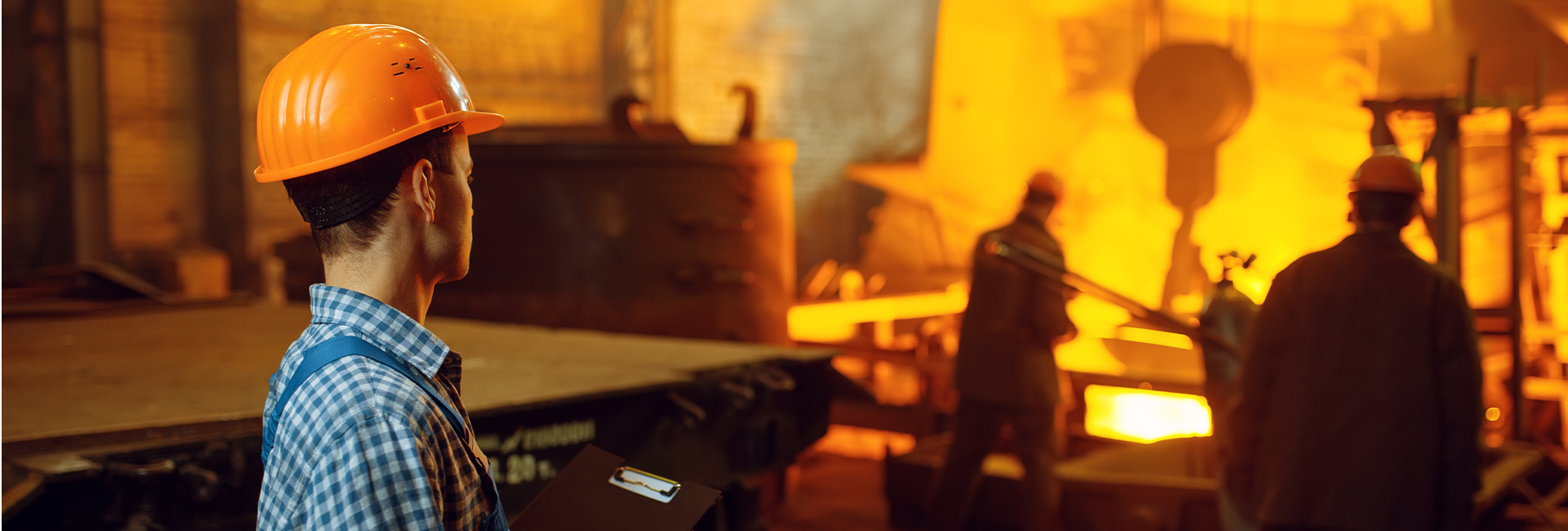The steel sector is incredibly important for construction, manufacturing, and advancing technology. A semi-finished steel product is called a billet. It is important to know what steel billets are and the steps involved in steel making to appreciate the amount of work and technology that goes into making steel products that are durable and withstand.
|
Table of Content
|
In layman's terms, steel billets are semi-finished castings produced during the steel-making process. These billets serve as the primary input for rolling mills, where they are further processed into structural shapes, bars, rods, and wires. These products serve a variety of industries, ranging from construction to machinery.
Also Read: Billet vs Cast vs Forged: Differences in Manufacturing Process
What are Steel Billets
To address what steel billets are, they are semi-finished steel products with a square or rectangular cross-section. Steel billets, as their name suggests, are produced from steel either in a casting process or by using continuous casting machines, and are produced from steel that has been treated/refined in a furnace. Billets cannot be directly utilized in finishing applications like finished steel products. They need to be hot rolled or forged to be transformed into TMT bars, angles, channels, or wire rods. In short, they represent the final step in the transformation chain from molten steel to steel products.
If you are curious about what is a billet in the steel industry, they can be classified as the steel intermediates, which assure a specific level of quality, strength, and versatility required in the intermediate steel products.
Types of Steel Billets
There are different types of steel billets, each with unique characteristics like composition, method of production, and the intended application.
Continuous Cast Billets
- Produced through continuous casting machines.
- Ensure uniform quality, accurate dimensions, and minimal wastage.
- Increasingly used in modern steel plants for mass production.
Rolled Billets
- Formed by the rolling of ingots into billets.
- An older method that is now less common, but still found in some plants.
- Suitable for quality less demanding applications.
Square Billets
- Billets with a square cross-section.
- Mainly utilised in rolling mills for the production of bars, rods, and structural steel.
Rectangular Billets
- Billets with a rectangular, contoured shape with large dimensions.
- Best suited for making flat and wide products and heavy structural steel.
Special Alloy Billets
- Contain alloying elements like chromium, manganese, or nickel.
- Cater to specialised sectors like automotive, aerospace, or defence.
These types of steel billets illustrate the myriad ways billets can be fabricated and their intended applications across different industries.
Importance of Steel Billets in Steel Manufacturing
The value of steel billets in the manufacturing process is significant. Their functions include:
1. Intermediate Link
- Connect the molten steel with the finished steel products.
- Permit that the refined steel is converted to a finished, workable condition.
2. Quality Carrier
- The characteristics of billets determine the final product's quality.
- There is no defect in the billet if not rolled or forged products.
3. Versatile Raw Material
- Serve as a base material for generating diverse products.
- Their flexibility aids in the production of various grades of steel.
4. Cost Efficiency
- Low material costs for manufacturers, decreasing waste during production.
- Reduces costs for manufacturers in meeting bulk product needs.
To summarize, steel billets are critical for achieving accuracy, productivity, and uniformity in the steel manufacturing process.
Uses of Steel Billets
Regarding the steel billets uses, they encompass a variety of sectors. Among the most prominent uses of steel billets are the following:
1. Construction Industry
- Steel billets are processed into TMT bars, angles, and also into channels.
- They are often utilized in the construction of bridges, buildings, and skyscrapers.
- They can withstand the stresses caused by modern civil construction works.
2. Automotive Sector
- Billet forgings are made into gears, shafts, axles, and various other automotive components.
- They provide vehicles with the capability of withstanding a great deal of stress and wear.
3. Engineering and Machinery
- They are utilised in the manufacturing of machines, their components, and other tools and equipment.
- They are known to offer great accuracy and durability to heavy machinery.
4. Energy Sector
- Specialised alloy billets are utilised in the oil and gas industry, wind energy and power sectors.
- Protect against high temperatures and corrosion.
5. Wire Drawing
- Wire rods are obtained from billets and are subsequently drawn into wires.
- They can be used for fencing, electrical wiring, and other reinforcement applications.
6. Shipbuilding and Defence
- Alloy billets of higher-grade steels are also used in shipbuilding and defence.
- Provide harsh environment durability and resistance.
Hence, the applications of steel billets are more ubiquitous in daily use, and range from specialized fields demanding cutting-edge materials.
Also Read:
Benefits of Manufacturing Steel Billets
The benefits of the billets are evident in steelmaking in the following areas:
- Consistent Standards: Automated, uninterrupted processes such as continuous casting enhance uniformity and reduce defects.
- Endurance: The Strength of steel billets aids in manufacturing high-end and high-strength products such as TMT bars.
- Multiple Uses: Steel billets are used to manufacture products.
- Reduced Costs: Reduced costs due to the cost-effective continuous casting/rolling.
- Expanded Reach: Steel products are used in infrastructure and manufactured goods, boosting local and global demand.
Steel manufacture and industrial advancement would not have been possible without these advantages, making steel billets essential.
Obstacles in Producing Billets
Despite the importance of billets, their production still faces these industrial challenges:
- Spoiling: Steel billets are sensitive to molten steel, and any impurities can ruin the steel.
- Energy Use: A lot of energy goes to casting the billets and reheating them.
- Repetition Rate: Billets are sensitive to precise cutting. Ensuring pervasive precision in the predetermined form is very important to aid accuracy downstream.
- Environmental Issues: Steel manufacturing has to meet environmental regulations to minimise emissions and waste.
Advanced technology, quality control, and sustainable practices are required to overcome these challenges.
What Makes Billets Essential in Modern Industry?
Steel billets are a basic raw material and are very adaptable. Their importance is in the following characteristics:
- Versatility: Ready to be transformed into any shape.
- Mechanical Strength: Final products are guaranteed to endure stress, climate, and weight.
- Industry-Specific Features: Alloy billets are tailored to suit specific industrial needs.
The answer to “what is a steel billet and why is it the key?” lies in the fact that the steel billet serves as the backbone of several industry steel products.
The Future of Billet Production
Billets are straying away from the conventional methods as the industry is rapidly modernising. Upcoming shifts are:
- Automation in Casting: To minimise defects and boost accuracy.
- Fuel Consumption: Switching to furnaces that are energy-saving and environmentally friendly.
- Enhanced Billets: Creation of high-performance billets to be used in advanced applications.
- Eco-Friendly: Producing billets from recycled scrap metal instead of raw ore. With these changes, billet producers will meet industry demands and remain competitive in the international market.
Conclusion
To put it differently, steel billets sustain the steel industry as they are the backbone and the industry’s building block. billets undergo critical processing after the steel is melted in order to prepare it for use. The uses of steel billets are numerous and indispensable, starting with construction, automotive and ending with specialised industries.
Recognising what billets are in the steel industry, together with their types and their uses, helps in understanding the critical role of billets in today’s infrastructure and industry. They are unarguably versatile as well as strong and cost-friendly, and in those serving those factors, they help in sustaining the needs for steel all over the world.
As a reputed iron billets manufacturer and one of the industry’s key players, Sree Metaliks is well-known for delivering quality billets that form the foundation of premium steel products. We are trusted in the market as leading steel manufacturers due to our advanced technology, consistent quality standards, and commitment to maximising environmental benefits while meeting industry needs.
Also Read: The Guide To Buying The Best TMT Bars
For more information, please reach out to us at: Sales@sreemetaliks.com

